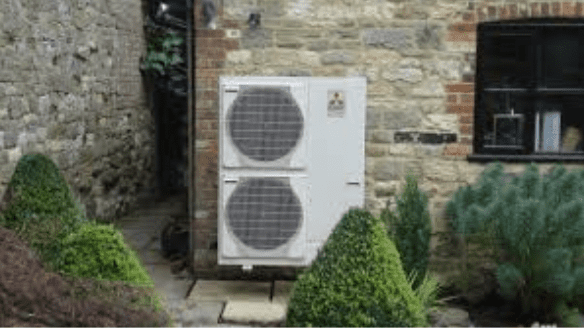
March 29, 2023 by John Borger, Hingham Net Zero
You’ve probably heard about heat pumps and may have questions. Let’s explore what these devices are and what they can do. We’ll focus on the more affordable air-source heat pumps which extract heat from the ambient air. (Ground-source, or “geothermal” heat pumps rely on temperatures many feet underground and require installation of pipes, which is more expensive and may not be feasible at many sites.) Both types of heat pumps can do more than just heat – they can also cool and dehumidify your home.
How does an air-source heat pump provide heat? Heat pumps are essentially air conditioners that can reverse the way they use refrigerant. In AC mode, the refrigerant in heat pumps absorbs heat from the inside air and exhausts it outside. In heat mode, the same refrigerant gas is used to absorb heat from the outside air and transfer it into your home. Cold air has heat that can be captured? Yes! The cold air is at a sufficient temperature to turn the refrigerant into a gas. The heat pump then pressurizes this gas, which heats it up. The heat pump thus “isolates” latent heat in outside air and brings it into your home. You may have heard that heat pumps do not work well in our frigid New England climate, and that when temperatures drop below freezing, the devices switch to costly “resistive” heat mode, similar to electric baseboard heaters. That may have been true ten years ago, but newer models without resistive back-up have been proven effective down to 13 degrees below zero. (My house is heated exclusively with these heat pumps. During the recent minus 4 degree F. days, they performed exactly as advertised.)
What is true is that, at 30-35 °F, the operating capacity and relative efficiency of heat pumps begins to gradually decline. That’s because the heat pump is compressing refrigerant gas to extract latent heat from the air outside. When that air approaches freezing, the compressor naturally has to work harder to supply equivalent heat. Even with this relative decline in efficiency in very cold temperatures, heat pumps are still far more efficient than burning natural gas, the cleanest fossil fuel.
The following data is from the Massachusetts Department of Energy Resources (DOER):
- The most efficient gas boilers have a relative efficiency of around 95% – for every 1.0 unit of
energy the boiler uses, it returns .95 of a unit in the form of BTUs of heat. - In contrast, for every unit of energy used by a heat pump, it returns anywhere from 3.2 to more
than 3.5 times that unit of energy as BTU’s – more than three times as good as the best gas
boiler at its peak efficiency.
Even in rare, extreme low temperatures, with operating capacity reduced by as much as 50%, electric heat pumps still work effectively and they still perform almost 70% better than gas boilers, yielding 1.6 units of heat per unit of energy input, versus .95 units of heat for gas boilers.
How do heat pumps reduce carbon released into the air? Because they do not burn fuel to generate heat, but merely isolate existing heat and move it, they are far more efficient than fossil fuel burning devices. Even when powered by electricity generated with natural gas, heat pumps still have a much lower carbon footprint than a traditional gas furnace. As Hingham Municipal Lighting Plant moves toward 100% carbon free electricity sourcing, heat pumps will similarly approach 100% carbon free.
Considering an investment in your home HVAC system? Go to the web site of Abode Energy
Management, HMLP’s customer support partner for heat pumps: https://abodeem.com/homeowners/select-your-mlp/hingham/ Talk to Abode or request coaching from a Hingham Net Zero climate coach here: https://www.hinghamnetzero.org/climate-coaching. Give your home the benefits of heat pump technology – you’ll save money, be more comfortable, and dramatically reduce your carbon footprint!


